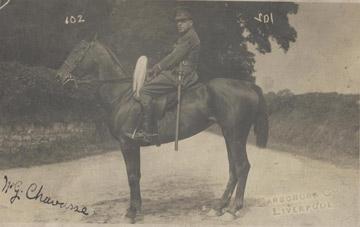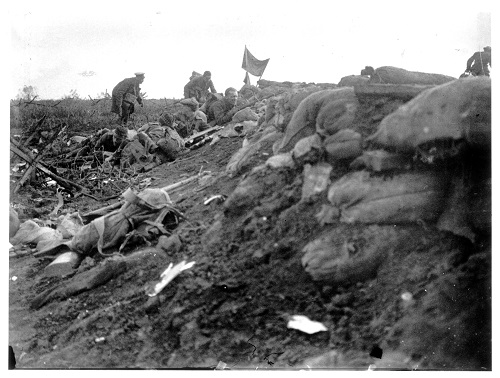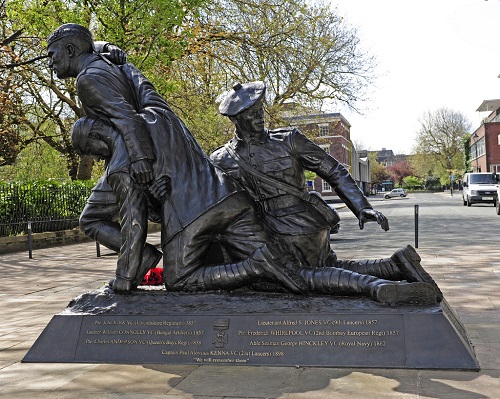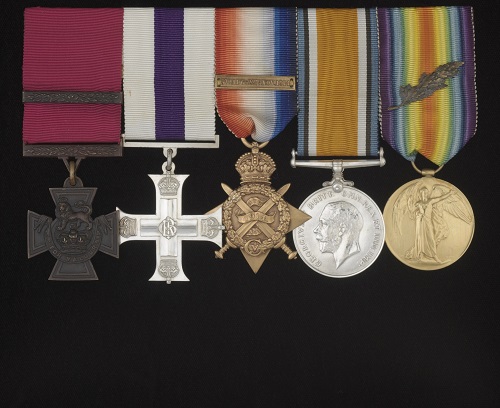Captain Noel Chavasse VC & Bar, MC (1884 - 1917)
Captain Noel Chavasse was the most highly decorated British serviceman in the First World War and was the only soldier in WWI to receive the honour of the Victoria Cross twice. We take a closer look at this legendary local War hero.

The son of the Bishop of Liverpool, Noel Chavasse was a medical doctor, who left behind his work at the call of King and Country in the autumn of 1914. Although he was an officer in the Royal Army Medical Corps, he was attached to the Liverpool Scottish Battalion - joining as second Medial Officer - and threw his whole heart and soul into the duty of caring for the men in his unit.
His first Gallantry Award was a Military Cross, for actions at Hooge in 1915. Long after the rest of his battalion had been relieved, he and his stretcher-bearers had stayed in the Front line to make sure that all of their wounded had been treated and brought in from no-mans-land. He reasoned that the closer his team was to the fighting, the sooner they could help those in need.

The battlefield at Hooge in 1915.
In the summer of 1916, he was promoted to the rank of Captain and again moved forward with the Liverpool Scottish as they went into battle, this time at Guillemont, on the Somme. During an attack, he attended the wounded in the open for two days under heavy fire, frequently in view of the enemy. He and his team again worked tirelessly to treat and retrieve as many wounded as possible, despite being wounded himself. Altogether he saved the lives of some twenty badly wounded men. He also collected the ID tags of those who had died, to notify families of their fate.
For these actions at Guillemont he was awarded his first Victoria Cross (VC), for conspicuous bravery and devotion to duty, which he collected from King George V, in February 1917, at Buckingham Palace.

The Liverpool Heroes Memorial in Abercromby Square is situated close to the Bishop’s Palace, the Chavasse family home from 1900. The statue depicts Noel and a stretcher-bearer rescuing a soldier. Image courtesy Bill Sergeant
He was awarded the VC again at Passchendaele, also known as the Third Battle of Ypres.
The Liverpool Scottish occupied trenches close to the town of Wieltje. Their objective was to push east into the enemy trenches that formed a salient around the town of Ypres. They made good progress and by the afternoon, had captured and consolidated the German Front line. Noel set up his aid post in a captured German dug-out.
On the first day of the battle he’d suffered a head wound whilst carrying a wounded soldier to the dressing station, but refused to leave his post. It is thought that he was wounded again on the second day. For two days Noel continued to perform his duties and also went out repeatedly under heavy fire to search for and attend to the wounded who were lying out. During these searches - without food, worn with fatigue and faint with his wound - he assisted to carry in a number of badly wounded men over heavy and difficult ground. By his extraordinary energy and inspiring example he was instrumental in rescuing many wounded who would have otherwise undoubtedly succumbed under the bad weather conditions. On 2 August, after more than 48 hours of continuous work with little chance to rest, Noel was in the dug-out, when it took a direct hit from an enemy shell.
All of the men inside were either killed or badly wounded. Noel had several wounds. He was bleeding heavily from his stomach, but made his way back from the Front line in search of help.
His last days were spent in Casualty Clearing Station No32, close to Brandhoek, where he died of his wounds at 1pm on 4 August 1917.
His second Victoria Cross was awarded posthumously, this time presented privately to Noel’s father, Francis Chavasse, Bishop of Liverpool

Captain Noel Chavasse (VC and Bar, MC) medal group
A Liverpool bombardier, who was with him all day on July the 31st, wrote:
"Gee! He did work! I was beginning to think he was not human, because nothing made him flinch or duck. The first wound that he received was in the head, and all he did was to take his tin hat off, jammed there, put a bandage around his head, and carry on. This he did all day and all night until the next wound he got, in the side, did for him. By Jove, it didn't half cut up the boys, because a man like that is not made to be killed. He is a hero of heroes. A V.C. is too small a reward for such a man."
He is commemorated on the war memorial in :
Liverpool College Junior School, Queens Drive, Sefton Park
Unidentified Memorial (now in Slaughterhouse Pub 13 Fenwick St)
Liverpool Cricket & Rugby Clubs, now in Liverpool Cricket Club, Aigburth Rd
Liverpool Anglican Cathedral, War memorial transept
Liverpool University, Victoria Hall, Brownlow Hill
